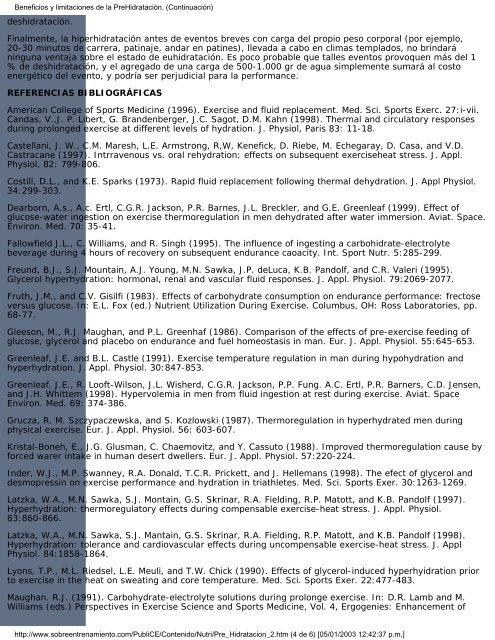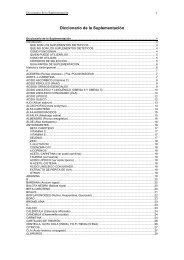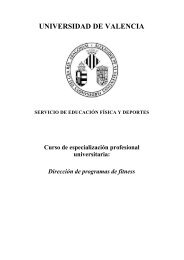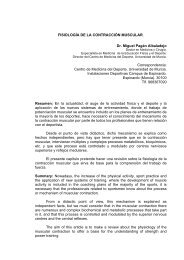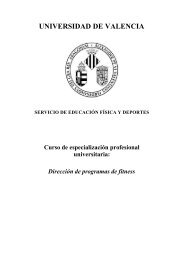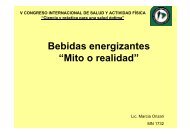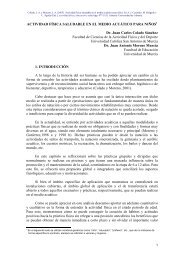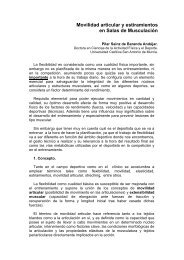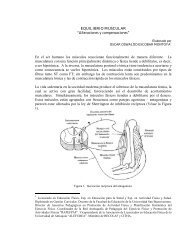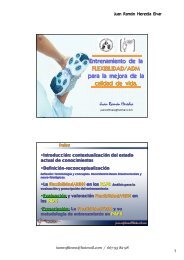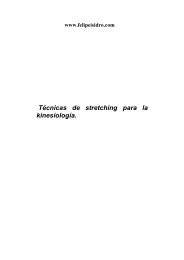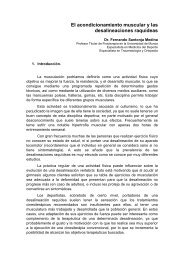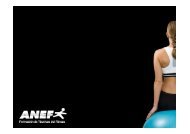Consumer.es ::: Salud y Alimentación - Felipe Isidro Donate
Consumer.es ::: Salud y Alimentación - Felipe Isidro Donate
Consumer.es ::: Salud y Alimentación - Felipe Isidro Donate
You also want an ePaper? Increase the reach of your titles
YUMPU automatically turns print PDFs into web optimized ePapers that Google loves.
Beneficios y limitacion<strong>es</strong> de la PreHidratación. (Continuación)<br />
d<strong>es</strong>hidratación.<br />
Finalmente, la hiperhidratación ant<strong>es</strong> de eventos brev<strong>es</strong> con carga del propio p<strong>es</strong>o corporal (por ejemplo,<br />
20-30 minutos de carrera, patinaje, andar en patin<strong>es</strong>), llevada a cabo en climas templados, no brindará<br />
ninguna ventaja sobre el <strong>es</strong>tado de euhidratación. Es poco probable que tall<strong>es</strong> eventos provoquen más del 1<br />
% de d<strong>es</strong>hidratación, y el agregado de una carga de 500-1.000 gr de agua simplemente sumará al costo<br />
energético del evento, y podría ser perjudicial para la performance.<br />
REFERENCIAS BIBLIOGRÁFICAS<br />
American College of Sports Medicine (1996). Exercise and fluid replacement. Med. Sci. Sports Exerc. 27:i-vii.<br />
Candas, V.,J. P. Libert, G. Brandenberger, J.C. Sagot, D.M. Kahn (1998). Thermal and circulatory r<strong>es</strong>pons<strong>es</strong><br />
during prolonged exercise at different levels of hydration. J. Physiol, Paris 83: 11-18.<br />
Castellani, J. W., C.M. Mar<strong>es</strong>h, L.E. Armstrong, R,W, Kenefick, D. Riebe, M. Echegaray, D. Casa, and V.D.<br />
Castracane (1997). Intrravenous vs. oral rehydration: effects on subsequent exerciseheat str<strong>es</strong>s. J. Appl.<br />
Physiol, 82: 799-806.<br />
Costill, D.L., and K.E. Sparks (1973). Rapid fluid replacement following thermal dehydration. J. Appl Physiol.<br />
34:299-303.<br />
Dearborn, A.s., A.c. Ertl, C.G.R. Jackson, P.R. Barn<strong>es</strong>, J.L. Breckler, and G.E. Greenleaf (1999). Effect of<br />
glucose-water ing<strong>es</strong>tion on exercise thermoregulation in men dehydrated after water immersion. Aviat. Space.<br />
Environ. Med. 70: 35-41.<br />
Fallowfield J.L., C. Williams, and R. Singh (1995). The influence of ing<strong>es</strong>ting a carbohidrate-electrolyte<br />
beverage during 4 hours of recovery on subsequent endurance caoacity. Int. Sport Nutr. 5:285-299.<br />
Freund, B.J., S.J. Mountain, A.J. Young, M.N. Sawka, J.P. deLuca, K.B. Pandolf, and C.R. Valeri (1995).<br />
Glycerol hyperhydration: hormonal, renal and vascular fluid r<strong>es</strong>pons<strong>es</strong>. J. Appl. Physiol. 79:2069-2077.<br />
Fruth, J.M., and C.V. Gisilfi (1983). Effects of carbohydrate consumption on endurance performance: frectose<br />
versus glucose. In: E.L. Fox (ed.) Nutrient Utilization During Exercise. Columbus, OH: Ross Laboratori<strong>es</strong>, pp.<br />
68-77.<br />
Gle<strong>es</strong>on, M., R.J. Maughan, and P.L. Greenhaf (1986). Comparison of the effects of pre-exercise feeding of<br />
glucose, glycerol and placebo on endurance and fuel homeostasis in man. Eur. J. Appl. Physiol. 55:645-653.<br />
Greenleaf, J.E. and B.L. Castle (1991). Exercise temperature regulation in man during hypohydration and<br />
hyperhydration. J. Appl. Physiol. 30:847-853.<br />
Greenleaf, J.E., R. Looft-Wilson, J.L. Wisherd, C.G.R. Jackson, P.P. Fung. A.C. Ertl, P.R. Barners, C.D. Jensen,<br />
and J.H. Whittem (1998). Hypervolemia in men from fluid ing<strong>es</strong>tion at r<strong>es</strong>t during exercise. Aviat. Space<br />
Environ. Med. 69: 374-386.<br />
Grucza, R. M. Szczypaczewska, and S. Kozlowski (1987). Thermoregulation in hyperhydrated men during<br />
physical exercise. Eur. J. Appl. Physiol. 56: 603-607.<br />
Kristal-Boneh, E., J.G. Glusman, C. Chaemovitz, and Y. Cassuto (1988). Improved thermoregulation cause by<br />
forced warer intake in human d<strong>es</strong>ert dwellers. Eur. J. Appl. Physiol. 57:220-224.<br />
Inder, W.J., M.P. Swanney, R.A. Donald, T.C.R. Prickett, and J. Hellemans (1998). The efect of glycerol and<br />
d<strong>es</strong>mopr<strong>es</strong>sin on exercise performance and hydration in triathlet<strong>es</strong>. Med. Sci. Sports Exer. 30:1263-1269.<br />
Latzka, W.A., M.N. Sawka, S.J. Montain, G.S. Skrinar, R.A. Fielding, R.P. Matott, and K.B. Pandolf (1997).<br />
Hyperhydration: thermoregulatory effects during compensable exercise-heat str<strong>es</strong>s. J. Appl. Physiol.<br />
83:860-866.<br />
Latzka, W.A., M.N. Sawka, S.J. Mantain, G.S. Skrinar, R.A. Fielding, R.P. Matott, and K.B. Pandolf (1998).<br />
Hyperhydration: tolerance and cardiovascular effects during uncompensable exercise-heat str<strong>es</strong>s. J. Appl<br />
Physiol. 84:1858-1864.<br />
Lyons, T.P., M.L. Riedsel, L.E. Meuli, and T.W. Chick (1990). Effects of glycerol-induced hyperhyidration prior<br />
to exercise in the heat on sweating and core temperature. Med. Sci. Sports Exer. 22:477-483.<br />
Maughan. R.J. (1991). Carbohydrate-electrolyte solutions during prolonge exercise. In: D.R. Lamb and M.<br />
Williams (eds.) Perspectiv<strong>es</strong> in Exercise Science and Sports Medicine, Vol. 4, Ergogeni<strong>es</strong>: Enhancement of<br />
http://www.sobreentrenamiento.com/PubliCE/Contenido/Nutri/Pre_Hidratacion_2.htm (4 de 6) [05/01/2003 12:42:37 p.m.]


